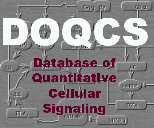
|
Enter a Search String | | Special character and space not allowed in the query term.
Search string should be at least 2 characters long. |
Molecule Parameter List for G-GDP | The statistics table lists the distribution of a molecule acting either as a substrate, product, enzyme or as a molecule within the network.
The text color of a molecule is highlighted by  color. color. | | Statistics |
Accession and Pathway Details | |
| Accession Name | Accession No. | Accession Type | Pathway Link | MAPK_network_
2003 | 50 | Network |
Shared_Object_MAPK_network_2003, PKC, PLA2,
PLCbeta, Gq, MAPK,
Ras, EGFR, Sos,
PLC_g, CaMKII, CaM,
PP1, PP2B, PKA,
AC | | This is a network model of many pathways present at the neuronal synapse. The network has properties of temporal tuning as well as steady-state computational properties. In its default form the network is bistable.Bhalla US Biophys J. 2004 Aug;87(2):745-53 |
G-GDP acting as a Molecule in MAPK_network_2003 Network
| Name | Accession Name | Pathway Name | Initial Conc.
(uM) | Volume
(fL) | Buffered | | G-GDP | MAPK_network_
2003
Accession No. : 50 | Gq
Pathway No. : 210 | 1 | 1000 | No | | From M&L, total Gprot = 1e5molecules/cell At equil, 92340 are here, 400 are in G*GTP, and another 600 are assoc with the PLC and 6475 are as G*GDP. This is OK. From Pang and Sternweis JBC 265:30 18707-12 1990 we get conc est 1.6 uM to 0.8 uM. A number of other factors are involved too. |
G-GDP acting as a Substrate in a reaction in MAPK_network_2003 Network
| Kd is calculated only for second order reactions, like nA+nB <->nC or nA<->nC+nD, where n is number and A,B,C,D are molecules, where as for first order reactions Keq is calculated.
Kd for higher order reaction are not consider. |
| | Name | Accession Name | Pathway Name | Kf | Kb | Kd | tau | Reagents | | 1 | Basal-Act-G | MAPK_network_
2003
Accession No. : 50 | Gq
Pathway No. : 210 | 0.0001
(s^-1) | 0
(uM^-1 s^-1) | - | - | Substrate
G-GDP
Product
BetaGamma
G*GTP
| | | kf = kg1 = 0.01/sec, kb = 0. This is the basal exchange of GTP for GDP. | | 2 | Rec-Glu-bind-Gq | MAPK_network_
2003
Accession No. : 50 | Gq
Pathway No. : 210 | 0.006
(uM^-1 s^-1) | 0.0001
(s^-1) | Kd(bf) = 0.0167(uM) | - | Substrate
G-GDP
Rec-Glu
Product
Rec-Glu-Gq
| | | This is the k1-k2 equivalent for enzyme complex formation in the binding of Rec-Glu to Gq. See Fay et al Biochem 30 5066-5075 1991. kf = 5e-5 which is nearly the same as calculated by Fay et al. (4.67e-5) kb = .04 June 1996: Closer reading of Fay et al suggests that kb <= 0.0001, so kf = 1e-8 by detailed balance. This reaction appears to be neglible. | | 3 | Rec-bind-Gq | MAPK_network_
2003
Accession No. : 50 | Gq
Pathway No. : 210 | 0.6
(uM^-1 s^-1) | 1
(s^-1) | Kd(bf) = 1.6667(uM) | - | Substrate
G-GDP
mGluR
Product
Rec-Gq
| | | Lets try out the same kinetics as the Rec-Glu-bind-Gq This is much too forward. We know that the steady-state amount of Rec-Gq should be 40% of the total amount of receptor. This is for a different receptor, still we can try to match the value. kf = 1e-6 and kb = 1 give 0.333:0.8 which is pretty close. |
G-GDP acting as a Product in a reaction in MAPK_network_2003 Network
| Kd is calculated only for second order reactions, like nA+nB <->nC or nA<->nC+nD, where n is number and A,B,C,D are molecules, where as for first order reactions Keq is calculated.
Kd for higher order reaction are not consider. |
| Name | Accession Name | Pathway Name | Kf | Kb | Kd | tau | Reagents | | Trimerize-G | MAPK_network_
2003
Accession No. : 50 | Gq
Pathway No. : 210 | 6
(uM^-1 s^-1) | 0
(s^-1) | - | - | Substrate
BetaGamma
G*GDP
Product
G-GDP
| | kf == kg3 = 1e-5 /cell/sec. As usual, there is no back-reaction kb = 0 |
| Database compilation and code copyright (C) 2022, Upinder S. Bhalla and NCBS/TIFR
This Copyright is applied to ensure that the contents of this database remain freely available. Please see FAQ for details. |
|
